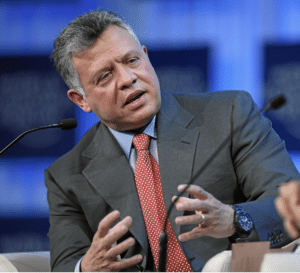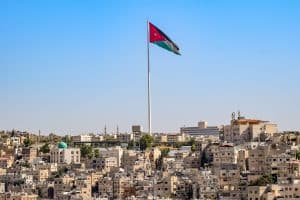On June 4th Jordan’s King Abdullah II accepted the resignation of Prime Minister Hani al-Mulki. Mulki submitted his resignation after a week of protests against his government over an income tax bill and massive price hikes in the last several months. Current education minister Omar al-Razzaz will replace Mulki. Protesters demanded economic relieve and a new government. Mulki was responsible for a rigorous economic reform program in order to get the sluggish economy of the kingdom back on track. The country’s economy has suffered from regional turmoil and a refugee crisis in recent years. Fueling large spread discontent. It is however the question if government change will give protesters what they want. In the constitutional monarchy the ultimate authority lies with the king.
Gaining momentum
For several months low level protests took place in multiple Jordanian cities. Protestors called for an end to the economic hardship. This message gained momentum in May when Mulki’s government sent a new tax bill to parliament. The bill will raise income taxes by at least 5%, the corporate tax by 20% and widen the number of people who should pay taxes. People started to protest in front of the cabinet’s office on May 30th, demanding the resignation of Mulki’s government. More people joined the protest after unions started to call for strikes.
In reaction to the growing discontent in the country, King Abdullah hoped that temporarily freezing price increases on fuel and electricity would relieve the economic hardship. Nonetheless did the protests only grow. Protesters stressed that small measures would not help this time. “We are all here today to send a message to the government that we will not be silent this time […] we want the unfair law withdrawn and we want the government to resign,” according to one demonstrator.
Demonstrators started on June 1st with road closures, strikes and blockades of several government buildings in Amman and other cities. During numerous instances police had to step in to maintain order. Trying to deescalate the situation, Lower House Speaker, Atef Tarawneh, called for talks between the government and the unions. Meanwhile, an increasing number of MP’s joined the side of the protestors. Also all political parties, including the Jordanian Social Democratic Party (JSDP), youth groups and syndicates went to the streets. Around 90 MP’s signed a memorandum calling to revoke the bill. In reaction to this growing discontent Mulki resigned and king Abdullah appointed Omar al-Razzaz, a former World Bank economist, to form a new government to deal with the problems. Most parties said they await the programme and agenda of the prime minister designate, before calling for new protests.
Economic hardship
Under the reign of king Abdullah II the country has known liberalizing economic policies. Making Jordan according to the World Bank an “upper middle income country”. Nonetheless has the Jordanian economy suffered in recent years from conflicts in the region, a large group of refugees in the country and the enormous public debt (95% of the GDP). In 2016 the IMF and Amman agreed upon a reform package to get the Jordanian economy back on track. The package proposed a set of tax hikes to relieve the public debt. Mulki pushed these reforms by introducing new taxes and cutting subsidies.
Even though it is clear that some reforms are needed to tackle the economic problems of the country, the current set of reforms effect a large part of the population. Especially people in the southern and northern provinces are dependent on government subsidies and employment. Some key reforms have resulted in higher prices in essential basic needs such as bread (up by 150% since February), fuel and electricity (up by 55% since February). In the meantime wages haven’t grown. According to the Economist Intelligence Unit Jordan is currently one of the most expensive Arab countries to live in.
Structural political problems
Voicing this discontent is difficult in Jordan. The people and the parliament have limited influence on the executive branch. Parliament can disapprove of the government or its policy by a vote of no-confidence. However almost no party culture exists. Political parties have long been forbidden, with as result that most MP’s are independent and are loyal to monarchial and tribal structures. The required majority to disapprove government plans is difficult to gain. This was evident last February when the largest parliamentary bloc, the National Reform Front, started an unsuccessful vote of no-confidence in reaction to new taxes on food.
Popular protest against government policy has proved more successful in the last couple of decades. Several PM’s resigned under public pressure. However these steps are largely symbolic. The king still holds the most of the political power. And even though is role is often viewed as a mediator in the country there are several problems with the political system. The Prime Minister is appointed by the king for a non-fixed term and often doesn’t come from the elected parliament, but from the loyal elite. As a result the person who holds the office of prime minister can change, but policies will probably remain.
Sources: Al Jazeera Jordan Times I Jordan Times II Jordan Times III Jordan Times IV


